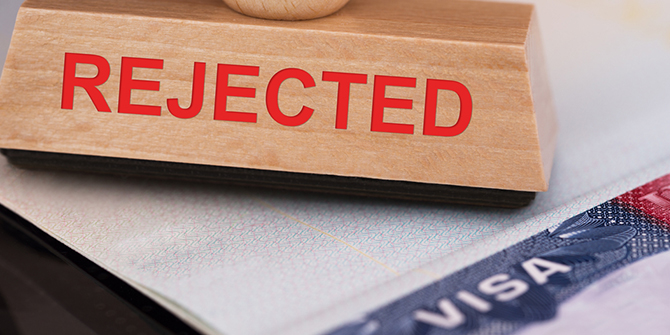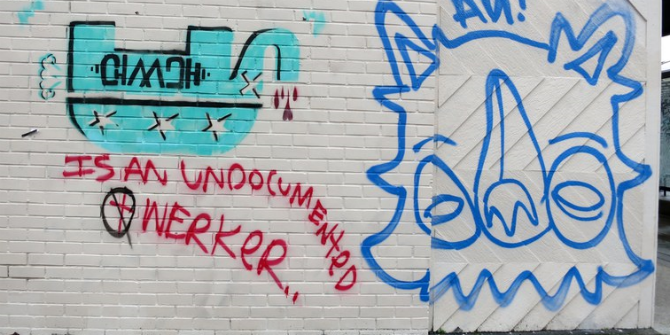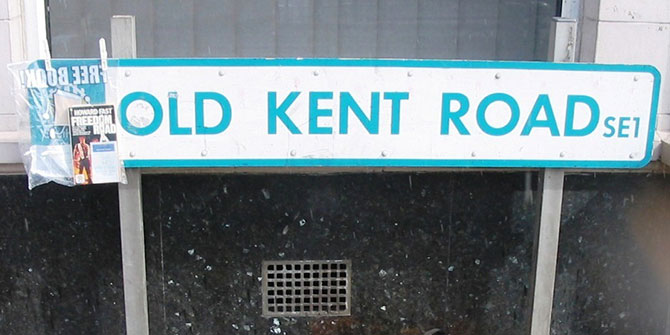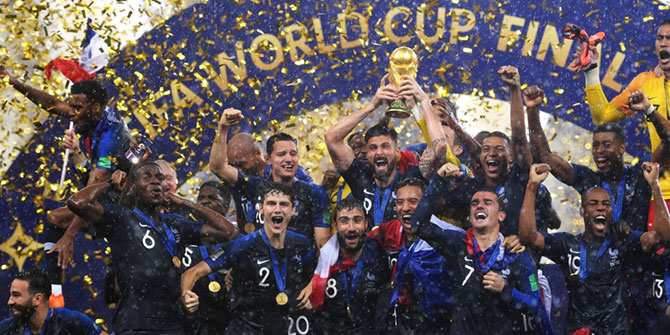Artist Charity Atukunda reveals the hurdles faced by African nationals attempting to travel freely, and how they are rooted in the idea of ‘escaping’ home for the ‘first world’. Recounting personal experience, and using illustrations, Charity exposes the unequal treatment of people globally who seek free movement.
This post is part of a mini-series exploring the global inequalities of the visa system and its effects.
The UK Visa and Immigration centre was quiet. Everyone spoke in low voices or whispered; a giant UK flag sticker was neatly adhered to the wall and a glass barrier separated me from the receptionist. Her photocopier was down and she was impatient. She told me to go into the next room after looking through my papers. It was air conditioned. Two people sat and waited ahead of me.
It was mostly women doing all the work – beautiful, young, Ugandan women in their early 30s, I guessed, with delicate features, silk floral blouses, perfect haircuts, expensive perfumes and manicured nails that made rhythmic clicks on their computer mice as they processed documents. While they had kind faces they seemed to have mastered the art of detachment as required by their employers.
All this reminded me of my first emotional tax in 2008, in Uganda, a land my family hadn’t seen for 12 years but was called home. My sister and I made our way to the US Embassy to apply for visas in order to return and continue our education in the USA. The embassy stretched across the busy Ggaba road, with a high wall.

To this day my sister and I joke and call our interviewer Mr. Smith, like the villain from the Matrix. There was a cold calculated way about him during our interviews, or maybe we imagined it, but his response was NO. Twice. We couldn’t go back to America after living and learning there for 12 years, we couldn’t continue our lives, our education, because we had a lack of strong ties to our own country, he said, and we would never come back to Uganda if we were allowed to return to America. You can imagine the sadness and disappointment and what it meant to start over.
I read the papers in front of me again. The air conditioning, which was refreshing upon entry, now entered my skin. The Visa Processing Centre could not be held liable if a visa was rejected. The lady in front of me was now going through my paperwork, checking boxes and crossing out lines for the things I was missing.

My first experience of Visa Processing Centres, and the money making machines they are, was when I applied for a visa to South Africa in 2016. The system is designed in such a way that your whole life, your entire narrative on paper, has to make perfect sense to a stranger. I thought that going to another African country would be simpler, but no… However, I was determined not to miss out, so I did my research. I presented my papers to the one of the visa tellers. At first she was surprised. She was used to sending people back, but my papers were in order. Just as she was about to stamp and approve, the bright yellow fever card caught her eye again. She handed me back my papers and said, ‘You took this vaccination too late, you have to wait at least 10 days before travelling.’ I said to her that by the time I would be in South Africa 10 days will definitely have passed. She said, ‘no, it’s not possible’.

With a great weight hanging on my shoulders and having to motivate myself again, despite the fear of another looming NO, I went back to Kampala Capital City Authority, got a second injection, backdated my card and returned to the Visa Processing Centre to resubmit my papers. Because of that one delay my visa, although approved, arrived two days after my flight and I never went to South Africa.
Despite my disappointments I tried again, this time to the UK for the Africa Summit at the London School of Economics. I was invited as a delegate to present my work and, of course, I was determined. In all these experiences I couldn’t help but be bothered by the fact that these things probably don’t happen to my white friends or those who hold ‘good’ passports, such as people from Europe or America. They are not aware this world exists or, if they are, they do not have to experience it. In those moments when I fill out visa applications I envy the ease of being able to travel wherever you want, when you want, without having to prove to someone that you are worthy.

It bothers me that these hurdles are set in place. The dominant narrative is that we all seek to escape our countries, yet some of us have no interest in ‘escaping’ to the ‘first world’.
There is a lot of ridicule towards the immigrant, the traveller of colour, when entering ‘first world’ countries, but few talk about the mostly white migrants and immigrants who have made a life in ‘third world’ countries, mislabelled as ‘expatriates’. Not all who enter have good intentions. There are so called ‘white saviours’, NGOs started left and right, churches of every denomination keen on claiming souls, volunteers, missionaries, all assigned their own category by Ugandan immigration; there are interns, adventurers, artists, entrepreneurs, and more. Some ‘expatriates’ spend years renewing tourists visas, or simply not having a status, bribing their pass through the decades. Rarely is it spoken about in influential media, but there are numerous people who profit from their privilege as foreigners. They amass wealth and live comfortably. Some fail and start a new venture, some stick around and take life day by day, and if things completely fall apart they can return to their home countries. Rarely are questions asked. Rarely are there reparations for social or economic damage caused or responsibility taken for what is left behind. They can start afresh somewhere else.
I believe in open doors. I believe we must look forward to a world where such a system is the future, and I will continue to try and travel though the odds are not in my favour. I have numerous opportunities to achieve everything I want and they will not stop coming, but the dominant narrative that allows someone like me, coming from a country like Uganda, to be aggressively interrogated and dehumanised in order to achieve mobility must be dismantled.

I think about all of this on a boda-boda ride, as I head back home. I hold my rejection statement in my purse, unsurprised but disappointed. My visa to the UK was rejected. They were not convinced or satisfied that I was a ‘genuine visitor’ to the UK based on my paperwork, believing that I did not sufficiently ‘demonstrate’ that I intend to leave the UK upon completion of my visit.
The last line I read on the rejection statement keeps playing in my head:
‘In relation to this decision, there is no right of appeal or right to administrative review’.
– British High Commission Pretoria
All illustrations are by Charity Atukunda.






You are right “these things probably don’t happen to my white friends or those who hold ‘good’ passports, such as people from Europe or America.” However, if they could they will do it. In a recent visit to UK for a conference after passing immigration with a “good” European passport inside of the airport when I was going out, I was twice “random“ checked by undercover police asking for ID and a set of questions about my stay in the UK…
Oh, have no doubt that these shenanigans happen to white people too; ask the Eastern Europeans. Heck, I’ve been deported from Scotland for the suspicion that I wouldn’t leave, and I’m American. The whole UK immigration apparatus in particular is an exercise in British bureaucracy — which is to say, it’s institutionally honest and fair about a process which is superficially neutral and somehow just *happens* to get more people who happen to be African or the like…
The real way in is to pay lots of money to an immigration attorney to fill out the application in exquisite detail, which is essentially a plausibly-deniable toll of hundreds or thousands of dollars.
@Rui and @dub: Proportionally, the numbers are just not the same between “white people” and people with “good” passports as opposed to the “others.” Overstaying and trying to “game the system” is another deal altogether (because this can happen to you in Asian or African country as well). This is also the question of getting into the country in the first place as a tourist, on business, or travelling for a conference. The point of the article to begin with is the freedom to travel, be a tourist, present your work in international conferences and workshops, thus giving you EQUAL opportunities to have the chance to succeed. The barriers to enter the “market” (in this case, the market = possibility to travel and have equal opportunities) are just not the same.
I suggest you look at the list of requirements from the previous article in this series: https://blogs.lse.ac.uk/africaatlse/2019/07/10/visa-applications-emotional-tax-privileged-passports/
The situation is disgusting. The UK Government is shameful. And your work is brilliant.
Oh, trust me, soildninja25 – as a white person from an African country who has been travelling for many years for both tourist and business purposes I can tell you that this happens to us as often as to people of colour. And of course, some countries are way worse than others. Take Greece, for instance. I had to attend a meeting in Athens before flying out to the States; they issued me a 3-day visa (still charged the same visa fee, though), despite me having held many Schengen visas, some valid for 2+ years, because as an African I may want to stay for longer than 1 day in Greece – despite me never having overstayed a visa more than 35 years of travel. I mean seriously? Greece? Where the economy is worse than most African countries and I don’t speak the language? Haha! Our passports suck because our governments are not interested in our plight – they are only in it for themselves.
Did LSE censor my last comment about my visa application experience?
That was a sad thing. My visa application has never been rejected, but I feel that there are a lot of requirements for me to supply document in order to travel from the third world to the first world.
I was suppose to go volunteer at an NGO. The pre-requisite to finding a job in my field is doing a three-six month free internship/volunteering. The NGO was located in the EU, I had all my papers, I had the money to show I’d be able to support myself, I had my return flight and a letter from the NGO stating exactly what I’d be doing, for how long with all their official information. My visa was rejected because they didn’t believe my reason for visit, they thought I’d use this as an excuse to move to other EU countries. They also thought the money in my bank (roughly £20,000) wasn’t sufficient.
Found another place to volunteer at, a BIG and reputable NGO that we all know about – think worldwide NGO (I don’t want to mention names) and they told me they couldn’t help me with my visa because I was a ‘restricted nationality’. I somehow managed to get there and learned that all my European and American colleagues had been working there for years on a tourist visa that got renewed in a matter of minutes. If I wanted to renew my visa, I’d have to send in an appeal 30-40 days before my expiration date and I may or may not get my extension.
Thank you for your article, I don’t feel as alienated anymore. I’m sorry this happened to you, I’m sorry this happened to me and I’m sorry this happens to so many of us but I hope we can do something to level the plane soon.
We need to fight this we as Africans lets take action about these things we must also not allow White European to enter our countries without VISA. We must hate them too because they hate us as Africans. Or we must not allow them to enter any African country lets depend upon ourselves we as Africans.